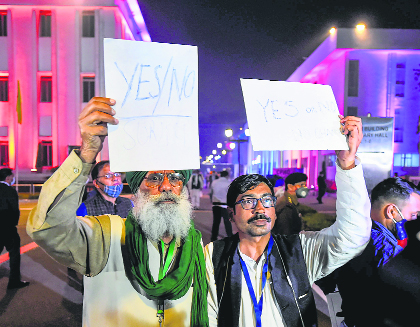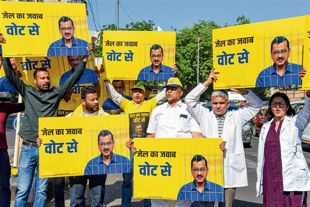
Deja vu: The ‘new’ proposal is just a rehash of what the ministers said to the farmers’ delegation on December 5. PTI
National President, Swaraj India
A bizarre logic is being deployed by the Narendra Modi government and a section of the media in the current standoff with the farmers: the recipient of an unwanted gift is being asked to be reasonable, not reject the gift, and find a ‘beech ka rasta’, or middle ground. The Modi government’s latest ‘proposal’ to the protesting farmers is being touted as just that middle ground. The government that put every possible obstacle to prevent farmers from reaching Delhi is being lauded for its sensitivity. When farm leaders stick to what they always said was non-negotiable, they are accused of moving the goalpost. The government frames not just its own response, but also what the farmers should be saying. Intransigence of the Modi government is presented as the rigidity of the protesters. Power has an amazing capacity to twist logic, to invent facts, to define what is reasonable.
Let’s not forget that the present protest began with what PM Modi described as a saugaat, a gift to the farmers, nothing short of a ‘historic’ bonanza. Now, accepting or not accepting a gift should normally be a voluntary affair. The gift givers either already know what the recipients want, or check with them. Otherwise, it should be reasonable for the recipient to say “No, thank you”, in case they don’t like the gift. Unless, of course, the gift is not a gift at all, unless it is a sugar-coated pill that must be administered to an unwilling patient. (Incidentally, that is how pro-government economists present these farm laws, a bitter pill that could only be administered under the cover of a pandemic).
A bounty farmers don’t want
This straightforward reasoning has been given the go-by in this instance. It is clear that the government did not bother to check with the farmers or farmers’ organisations, not even with their in-house Bharatiya Kisan Sangh, before offering this ‘bounty’. By now, it is also clear that this gift has no takers, at least none among the multitude of farm organisations in the country.
As for the farmers themselves, a Gaon Connection survey carried out a couple of months ago, much before the agitation hit its peak, found them apprehensive, if not hostile. The farmers are simply saying: “Thanks, please take your gift back. Instead, give us what we want, namely legal guarantee of remunerative price for our produce.” The Samyukta Kisan Morcha, the joint banner for the current protest, has consistently asked for the repeal of the three farm laws. They have repeatedly clarified that this demand is non-negotiable. Yet, the Modi government and a section of the media feigns surprise when the farmers insist upon it.
The government’s latest ‘proposal’ to the farmers invited a straightforward rejection. The 20-page document, printout of a PPT, sent by the government repeated the platitudes and propaganda that the ruling dispensation has been using for the past few months. Besides, there is a too-clever-by-half attempt to mention some previous committees involving Congress leaders, so as to implicate the Opposition parties in the government’s action. No wonder the government forgot to mention the 2011 report of the Chief Ministers’ committee headed by then Gujarat CM Narendra Modi that recommended legal status for Minimum Support Price (MSP). The ‘new’ proposal is just a rehash of what the ministers said to the farmers’ delegation on December 5.
The nine-point proposal contains nothing about the amendment to the Essential Commodities Act that the farmers had objected to because it would encourage hoarding and price manipulation. Presumably, the government is determined not to make any changes in this law that would help the agri-business plans of large corporates. Similarly, it has little to offer on the proposed punishment for the farmers under the air pollution ordinance, except a vague promise of redressing farmers’ objections. On the Electricity Amendment Bill, the government assures that farmers’ bills won’t be affected, without specifying how. The farmers are not amused.
On MSP, no legal guarantee coming
The much-publicised ‘concession’ on the issue of MSP is most disappointing. The government proposes to “give written assurance regarding the present MSP-based procurement system”. It is clear that the government is not going to offer a legal guarantee that the farmers had asked for. There is no mention of accepting the comprehensive cost-based formula (C2+50 per cent) recommended by the Swaminathan Commission for calculating the MSP. It is also clear that the government does not want to commit to going beyond the existing levels of meagre procurement. The farmers feel insulted.
The proposed amendments appear more substantial in the APMC bypass law [Farmers’ Produce Trade & Commerce (Promotion & Facilitation) Act] and the contract farming law [The Farmers (Empowerment and Protection) Agreement on Price Assurance and Farm Services Act]. The media reports that the private mandis will be charged the same fees and put under similar regulation as the APMCs, but the government proposal merely says that the state governments will be given the power to do so. The proposal does not address the real need of most of the farmers for more and better functioning APMCs, nor does it address their apprehension about the possible collapse of APMCs. Similarly, the government proposes to address the fears about alienation of land under contract farming, but offers nothing to correct the unequal bargaining position of the farmers in a contractual arrangement with corporates. The farmers feel they are being taken for a ride.
Yet the media seeks to shift the onus on to the farmers: now that the government is willing to amend these laws, why do you insist on repealing these? The farmers can only repeat what they have been saying all along: We never asked for amendments. Since we do not agree with the intent and the basic framework of these laws, we cannot possibly agree to amendments, major or minor. Can’t we say NO to your gift? Is it about us and our wellbeing, or about the PM’s prestige, his ego?
Or they could quote famous Punjabi revolutionary poet Avtar Singh Pash, incidentally someone who was killed by Khalistani militants: “Beech ka rasta nahin hota”. At least on some matters, at least at some points in history, we must not look for the middle path.
Views are personal
Join Whatsapp Channel of The Tribune for latest updates.




























